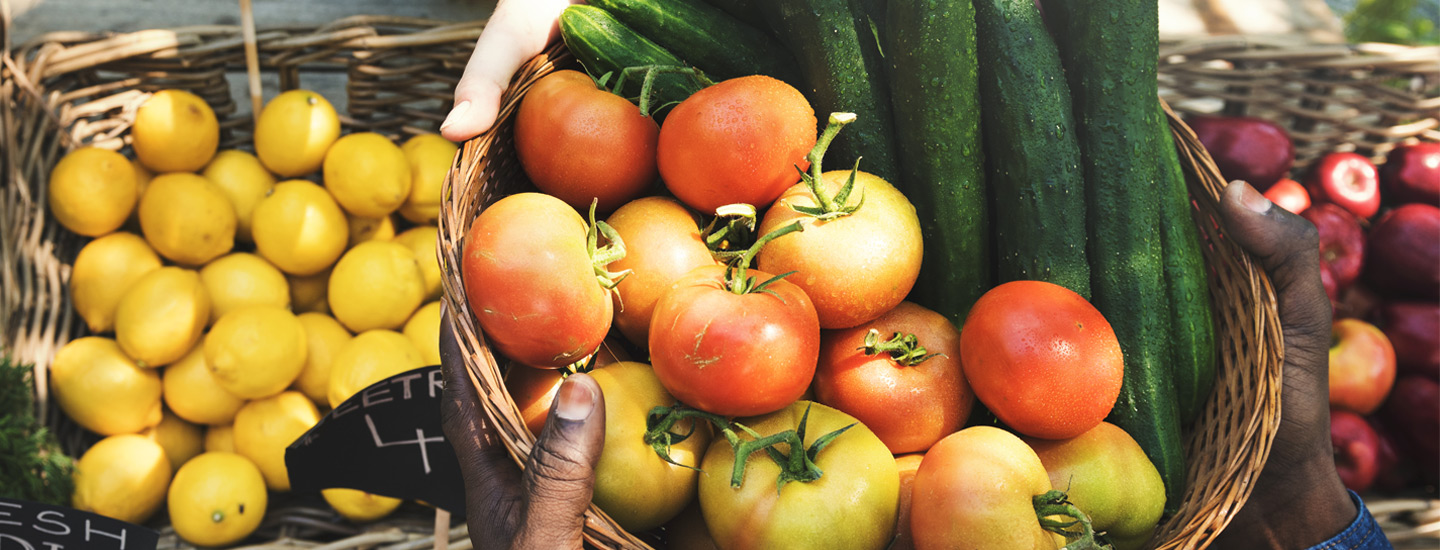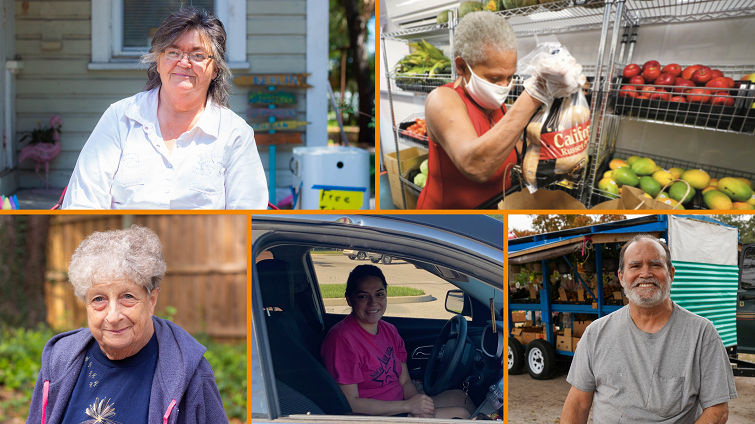Florida has 3.1 million hungry individuals and each one has a unique background story. Oftentimes, we do not picture an average middle-class family or an elderly individual as prime examples of hunger, but food insecurity is felt by people of all ages and several socioeconomic standing.
Hunger wears many faces. At Feeding Florida, we are focused on providing nutritious produce and food to every individual experiencing hunger, regardless of their circumstances. Here are a few stories of the unexpected faces of hunger in Florida.
Bonnie:
Bonnie applied for SNAP benefits after her finances were affected due to the COVID-19 pandemic and began visiting Feeding Tampa Bay after learning about their mobile distributions via social media. She was taken aback by the sheer number of people who relied on food distributions and the diversity amongst them all.
"If you’re struggling going to a food bank because of pride, this is the time to move past it, just move past it, because you’ll see your neighbor there, your friends there, your family there. Please don’t be ashamed, just do it,” said Bonnie, who also began visiting the food banks to collect food and deliver it to those in need.
Giovanna:
Giovanna Newbill was one of the first clients to experience Feeding Northeast Florida’s Corner Market. “I lost two-thirds of my income, and bill collectors don't care,” Newbill said. “So you can't really buy food if you only have enough to pay your power bill, it makes it very difficult.”
She said the Corner Market gives her healthy options she doesn't have otherwise. “When you only have a little bit of money, you buy what you can stretch, especially if you have kids. It's not always the healthiest thing, so I think this is awesome that they’re giving us healthy food and good vegetables.”
Joanne:
Since the passing of her husband nearly two months ago, Joanne has been left doing everything on her own. Her fixed income also changed significantly, and she now seeks the foods provided by Feeding Tampa Bay’s mobile pantry distributions to stay healthy.
Joanne said, “When you’re feeling down, every little bit helps. It's all about the H word, Hope.” Joanne’s' doctor asked her to eat lots of fruits and vegetables during this time. Thanks to the great support of community partners, Feeding Tampa Bay is able to bring fresh produce, protein, dry goods and hope to residents like Joanne.
Yesenia:
Yesenia, a mother of 4, tested positive for COVID-19 along with a few of her children, and she was left unable to work for some time, leaving her without income. Although her family dropped off food and helped pay her bills, she was still left feelings the effects of COVID for two months.
After learning about All Faiths Food Bank’s mobile distributions, she relied on the food and produce to help her family during their hard times. “Receiving food may seem simple, but for people like myself, it’s a big help,” said Yesenia. “It has made life less stressful. Big thank you”
Paul:
After a devastating car accident, Paul, a Tampa resident, was left with very little mobility in his left arm, shoulder and neck making cooking for himself very challenging. Paul said, "Cooking has always been a big part of my life. It’s been tough getting used to my capabilities after the accident. I spend all day alone, so coming here to socialize with others feels nice."
Every day since his accident, Paul carpools with his neighbor to Trinity Cafe for a delicious and warm meal. He is focusing on regaining his strength to get back to what he loves most, cooking.
Crystal:
Crystal and her family of six were comfortable before the pandemic hit. “There were times we had to rob Peter to pay Paul, but nothing like what we’ve had to do this year,” she says.
Her husband’s construction job took a big hit and now the hours are inconsistent from week to week and overtime does not exist. At first, they sold some extra furniture to make ends meet. Then, they pawned their television and other electronics to pay for groceries. Finally, Crystal started searching on the internet for free food, which led her to Second Harvest Food Bank of Central Florida.
At the pantry, Crystal received a variety of food, including milk, eggs, fresh produce, pantry staples and even a few treats for the kids. “We struggled for months to pay bills and feed our four kids,” says Crystal. “Now I tell all of our neighbors that there is no reason to be hungry, because Second Harvest is showing so much compassion and kindness to our community.”
Destiny:
Destiny, 8, and her mother Clavet discovered Treasure Coast Food Bank by visiting the Mobile Food Pantry in Indiantown. Before visiting the mobile pantry, their family was forced to choose between paying the bills and putting food on the table.
Destiny has Autism, so the family prioritizes her medication and care, which includes making sure she has the special diet she needs for her health. “We’ll do anything for her,” Clavet says. Since their family does not qualify for SNAP, the food provided by the food bank makes a significant difference in their lives.
During their first trip to the Mobile Pantry, Clavet and Destiny received enough food to last their family about three weeks. “If we hadn’t found the Mobile Food Pantry, we would’ve gone hungry,” says Clavet. This fall, Destiny will return to a new school year with the energy needed to create new friendships and learn new lessons thanks to the help of Treasure Coast Food Bank.
Joanne:
Seven years ago, Joanne H. helped start the Chum Bucket School Pantry which helps provide food for 80 students at Sebastian River High School and their families every week. “I had no idea that there were that many hungry people,” she says of the need for food that she has seen continue to grow.
Each Wednesday, students from a special needs class at the school volunteer to help pack boxes that will go out the following day. Joanne hopes to soon expand to provide food in the middle school as well. Each box provides enough food to make two to three meals, with most of the food coming from Treasure Coast Food Bank.
“To have the kids come and say, ‘thank you’ is the biggest reward.”
Anthony:
Anthony and his wife have three daughters. He’s a contractor and his wife receives Social Security Disability, and lately it’s been especially hard to keep enough healthy food on the table.
The family was evicted from their home, and rent prices are too high to rent somewhere else right now. In the meantime, they’re living in a hotel. At the hotel, they’re limited to cooking only the food they can prepare in a microwave, so they’ve had to use more money than usual eating out. Lately, Anthony says they’ve been living paycheck to paycheck.
Thankfully, the family can pick up nutritious, microwaveable groceries from the food pantry and with the money they’re saving by not eating out, they hope to save enough to rent a house again soon.
“Thank God for the food bank,” says Anthony after a recent visit to the food pantry at St. Helen’s Catholic Church in Vero Beach, a partner agency of Treasure Coast Food Bank.


